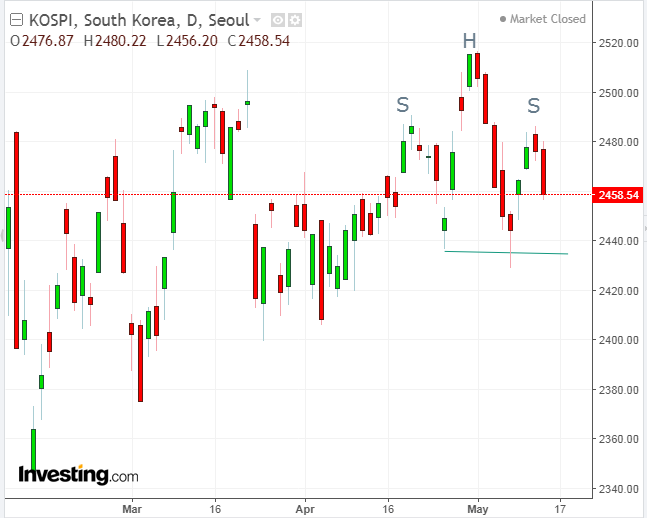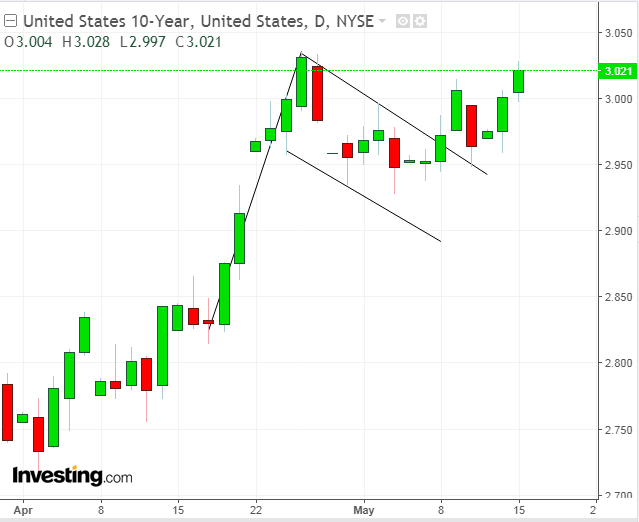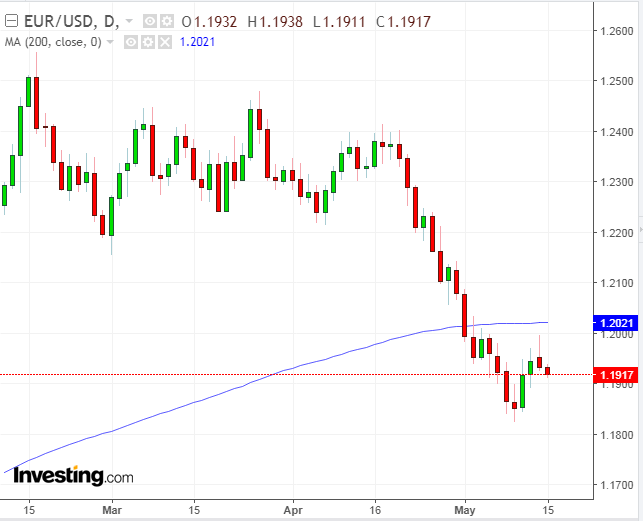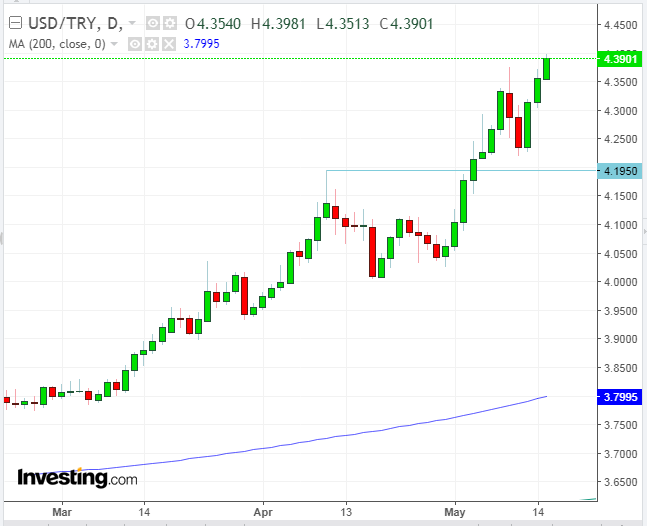- European equities seesaw; US futures slide
- Middle East tensions, US-China trade spat solution skepticism spark risk-off trade
- US dollar slips as 10-year Treasury yields cross 3% again
- China, Germany growth slows
- Turkish lira slumps to fresh lows on prospect of tighter government controls
Key Events
Stocks in Europe followed their Asian counterparts lower during Tuesday's early trade, alongside US futures for the S&P 500, the Dow and the NASDAQ 100.
Sentiment has shifted back to risk-off. Economic growth, Middle East tensions and trade jitters have reignited investor worries.
While US President Donald Trump was once again in the eye of the storm on Monday, the market narrative has taken a surprising twist. Though Trump has adopted a more conciliatory stance toward China, in particular by offering a reprieve to China's ZTE (SZ:000063), which had previously faced US sanctions, US lawmakers—on both sides of the aisle—have criticized his apparent change of priorities, diminishing investor hopes that trade tensions would finally cool off.
However, last night the Wall Street Journal reported that this reprieve might in fact be part of a quid pro quo, a way of easing "roadblocks in China faced by U.S. semiconductor company Qualcomm (NASDAQ:QCOM), whose proposed acquisition of NXP Semiconductors (NASDAQ:NXPI) of the Netherlands has been held up by Beijing."
Trump's apparent diplomatic U-turn went beyond our expectations that the White House would stay clear off any protectionist rhetoric in the run up to the meeting with North Korea’s Supreme Leader Kim Jong-un on June 12.
Global Financial Affairs
The STOXX Europe 600 slipped lower for a second day this morning, after fluctuating within a tight 0.1 percent range between the open and close in the previous three sessions, signaling that investors are struggling to gain traction in either direction. However, the continental index is inching slightly higher at the time of writing, to just above neutral levels.
Earlier in the Asian session, Japan's TOPIX ended a three-day straight advance by slipping 0.5 percent, despite a 0.2 percent positive open followed by gains of 0.35 percent during early trade.
China's Shanghai Composite bucked the negative trend seen across Asian markets, boosted by optimism around the MSCI inclusion to its equity indices of 234 China large cap A shares. The mainland benchmark index climbed 0.6 percent, closing at the top of the session and posting a total two-day advance of 0.95 percent.
Upbeat sentiment overshadowed worries about China's economy and ongoing trade tensions with the US. However, investors initially shed their stocks, after China missed estimates on investment and retail sales for April and a decline in home sales exacerbated the country's murky economic outlook.
Shares listed on Hong Kong's Hang Seng missed out on investor optimism and posted a1.15 percent slump, wiping out nearly all of Monday's gains and halting a six-day advance.
South Korea's KOSPI dropped 0.7 percent for a two-day 0.8 percent loss, while increasing the potential of completing a small H&S top since mid-April. Australia's S&P/ASX 200 also slid 0.7 percent, almost erasing three days of gains, while forming a bearish engulfing pattern and therefore confirming two earlier consecutive shooting stars.
The downbeat mood visible in global trading today follows a markedly risk-on US session yesterday that capped four days of consecutive gains for the S&P 500 and a eight-day winning streak for the Dow. US stock gains on Monday had been sparked by Trump's announcement that he would help ZTE get back on track after taking a hit from the recent US ban on its products.
Coming ahead of the June 12 US-North Korea summit—where China's leverage over Pyongyang and its potential denuclearization is crucial—Trump's latest move signaled his willingness to compromise on a less pivotal element in order to win the broader geopolitical game. However, widespread criticism over the move offset its positive effects on the markets.
The dollar scaled back from an early 0.15 advance to gain less than 0.5 percent, as 10-year Treasury yields climbed above 3 percent once again—as we had forecast last week.
The euro is extending losses to a second day, after yesterday's failed attempt at the 200 DMA. Single currency losses occurred against a backdrop of political uncertainty in Italy and dwindling economic growth in Germany. The latter country disappointed expectations by posting its weakest quarterly growth in a year: German GDP grew at a 0.3 percent pace—half the figure of the prior quarter—allegedly due to a loss of trade momentum. The slowdown in Europe's biggest economy underscores an increasingly evident trend that sees Europe as the weakest link in the synchronized global growth story—in stark contrast to mid-last year, when Europe replaced as the leader of global growth.
The Turkish lira hit a new low after President Recep Tayyip Erdogan said he intends to tighten his grip on the country's economy and take more responsibility for monetary policy if he wins presidential elections next month. The 4.1950 area is a presumed support, providing a potential entry for a USD/TRY long position.
Up Ahead
-
China plans to send Vice Premier Liu He to Washington for more trade talks on Tuesday.
-
UK Prime Minister Theresa May meets with her Brexit cabinet on Tuesday to discuss plans for a post-withdrawal customs union.
-
US retail sales and industrial production figures are due on Tuesday and Wednesday respectively.
-
Home Depot Inc (NYSE:HD) is scheduled to release corporate results before market open today, for the fiscal quarter ending April, with the EPS forecast of $2.07, versus $1.67 for the same quarter last year.
-
Cisco (NASDAQ:CSCO) is due to report earnings on Wednesday after market close, for the fiscal quarter ending April. Consensus EPS is $0.59, after the company reported $0.54 EPS for the same quarter last year.
-
Walmart (NYSE:WMT) is set to release its results on Thursday before market open, for the quarter ending April. The EPS estimate is $1.13, after last year’s $1.00 for the same quarter.
-
Campbell Soup (NYSE:CPB) is expected to release corporate earnings Friday before market open, for the fiscal quarter ending April, with an EPS consensus of $0.61, versus $0.59 for the same quarter last year.
Market Moves
Stocks
- The STOXX Europe 600 drops less than 0.05.
- Futures on the S&P 500 Index fall 0.2 percent, the first retreat in almost two weeks.
- The MSCI All-Country World Index declined 0.2 percent, the first retreat in a week and the largest drop in more than a week.
- The UK’s FTSE 100 gained 0.1 percent.
- Germany’s DAX fell 0.3 percent, the largest fall in a week.
- The MSCI Emerging Market Index decreased 0.9 percent, the first retreat in more than a week.
- The MSCI Asia Pacific Index sank 0.7 percent, the largest decrease in more than three weeks.
Currencies
- The Dollar Index gained 0.1 percent.
- The euro climbed less than 0.05 percent to $1.1932.
- The British pound dipped less than 0.05 percent to $1.355.
- The Japanese yen fell 0.2 percent to 109.86 per dollar, the weakest in more than 14 weeks.
Bonds
- The yield on 10-year Treasuries gained one basis point to 3.02 percent, the highest in almost three weeks.
- Germany’s 10-year yield climbed one basis point to 0.62 percent, the highest in almost three weeks.
- Britain’s 10-year yield increased one basis point to 1.482 percent, the highest in almost three weeks.
Commodities
- West Texas Intermediate crude dropped 0.1 percent to $70.87 a barrel.
- Copper slipped 0.3 percent to $3.08 a pound.
- Gold decreased 0.1 percent to $1,311.90 an ounce, the weakest in almost two weeks.




